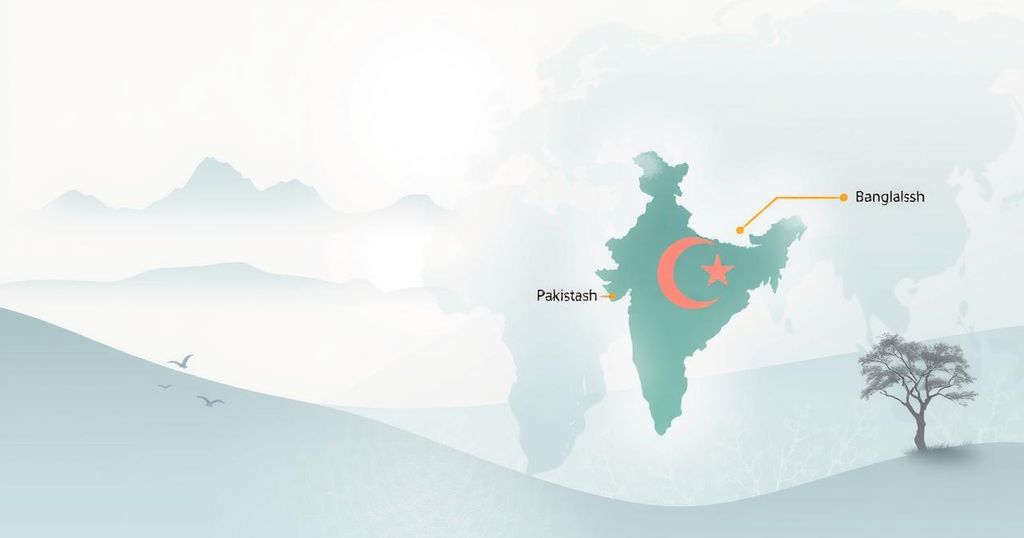Strengthening Ties: Pakistan and Bangladesh Move Closer Amid Shared Concerns

Pakistan and Bangladesh are experiencing a rapprochement following the ousting of Prime Minister Sheikh Hasina, driven by mutual anti-India sentiment and deteriorating relations with New Delhi. High-level meetings signify a potential reset in their relationship, underpinned by historical grievances and aspirations for economic collaboration amidst shifting geopolitical dynamics in South Asia.
Following the ousting of Sheikh Hasina, Pakistan and Bangladesh have strengthened their ties, largely driven by mutual apprehension toward India. General Asim Munir of Pakistan’s military recently hosted Lieutenant General SM Kamrul Hassan of Bangladesh, marking a significant diplomatic engagement between the two countries, which the Pakistani military characterized as a meeting of “brotherly nations.”
Historically, relations between Islamabad and Dhaka have been fraught, particularly during Hasina’s nearly 16-year tenure, which was marked by a pro-India stance. The recent rapprochement coincides with a broader nationalist wave in both countries, paving the way for enhanced military and diplomatic cooperation. High-level meetings, including those between Prime Minister Shehbaz Sharif and Bangladesh’s interim leader Muhammad Yunus, signal a shift in dynamics with potential geopolitical implications.
The backdrop to this developing partnership stems from Bangladesh’s separation from Pakistan in 1971, wrought by violent conflict and significant human rights violations. Despite Pakistani acknowledgment of Bangladesh’s independence in 1974, unresolved grievances remain, including demands for a formal apology for past atrocities. Yunus has urged a resolution to these longstanding issues for the sake of future generations.
Former officials suggest that Bangladesh’s recent moves may be influenced by deteriorating relations with India, particularly following the ousting of Hasina. The interim government’s call for India’s extradition of Hasina shows a strategic pivot that could lead to closer ties with Pakistan. However, analysts warn against interpreting these shifts as an outright alignment against India, given the geographical and economic realities that bind Bangladesh to its larger neighbor.
As South Asia witnesses evolving geopolitical landscapes, including India’s renewed engagement with the Taliban, Pakistan’s efforts to enhance its relationship with Bangladesh are noteworthy. The recent diplomatic exchanges could signify a new era of military and economic collaboration, crucial for Pakistan’s aspirations amid its economic struggles when juxtaposed with Bangladesh’s growth trajectory.
Both nations could find profitable avenues in trade, with Pakistan eyeing economic partnerships as a potential area for future cooperation. With Bangladesh’s economy expanding at a significantly faster rate than Pakistan’s, there are indications that trade relations may improve with renewed diplomatic efforts and eased travel restrictions.
The history of Bangladesh’s independence from Pakistan in 1971 continues to influence contemporary relations between the two nations. Following decades of tension, the recent political shifts in Bangladesh, particularly the removal of long-standing Prime Minister Sheikh Hasina, have provided a new context for Islamabad and Dhaka to reconsider their partnership, especially in light of shared concerns regarding India’s influence in the region. Furthermore, the political unrest in Bangladesh and the subsequent interim government’s stance against India signal an opportunity for Pakistan to foster closer ties. Analysts note that both nations may find common ground in military cooperation and addressing historical grievances as they navigate changing geopolitical realities, including India’s engagements in Afghanistan. Additionally, the economic disparity between Pakistan and Bangladesh and the need for improved trade relations is a significant factor warranting further exploration in diplomatic discussions.
In summarizing the evolving nature of relations between Pakistan and Bangladesh, it is evident that historical animosities are being overshadowed by contemporary geopolitical challenges, predominantly concerns regarding India. Enhanced military ties and escalating diplomatic engagement indicate a deliberate effort to recalibrate their relationship in a potentially new direction. However, lingering historical grievances and the complex nature of regional geopolitics remain critical factors that will influence the future trajectory of this partnership.
Original Source: www.aljazeera.com








